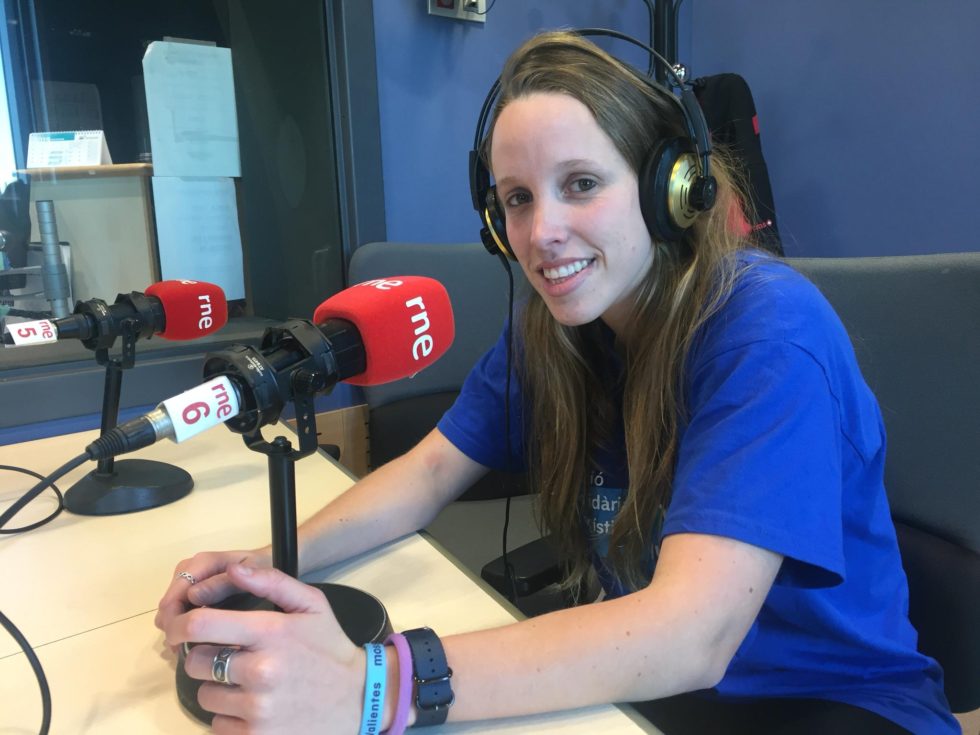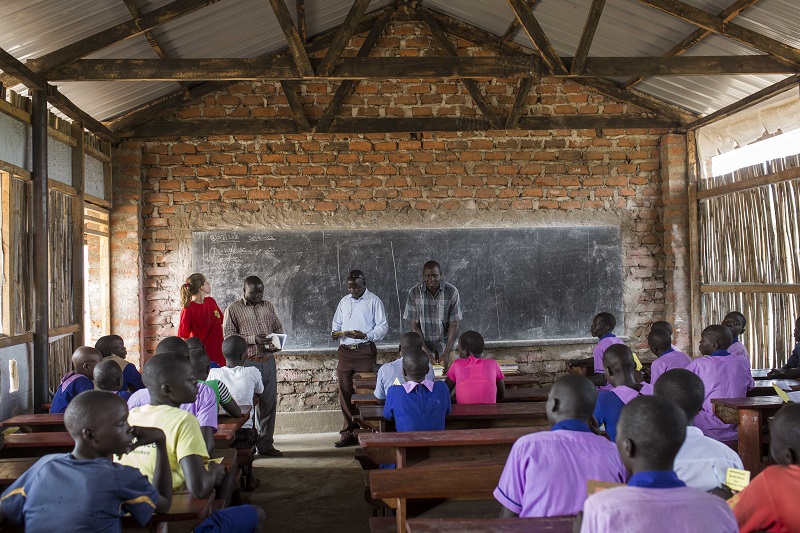“UPF’s collaboration has given us light at times when there was no light anywhere”
“UPF’s collaboration has given us light at times when there was no light anywhere”
Eva Brescó, an alumni of the bachelor’s degree in Political and Administration Sciences and a member of the NGO Acció Solidària i Logística.

Després de finalitzar el grau en Ciències Polítiques i de l’Administració a la UPF, el 2014, l’Eva Brescó ha participat en diferents projectes i accions solidàries. Des del 2012 col·labora amb l’ONG Acció Solidària i Logística i, des de fa anys n’és membre de la junta, com a secretària.
Since completing her bachelor’s degree in Political and Administration Sciences at UPF in 2014, Eva Brescó has participated in various charitable projects and actions. Since 2012 she has collaborated with the NGO Acció Solidària i Logística (Solidarity and Logistics Action) and, she has been a board member, acting as its secretary, for some years.
For the third year in a row, Acció Solidària i Logística (ASL) has received a grant under UPF’s 2021 call for financial assistance for social commitment and sustainable development. ASL designs and implements development cooperation projects in order to provide technical and logistic support and training to organizations, communities or initiatives working for global justice, especially in developing countries, and also performs emergency interventions in disasters.
- We know that you’re heading for Bosnia in a few days. What will you be doing there?
We started working in Bosnia a couple of years ago with refugees who are in transit to enter the European Union. There we got to know about the organization No Name Kitchen and their work and we started to collaborate. Our first task was to build a warehouse, and now that we can travel, two of us are going to help and to get our own project under way. We already have experience working with refugees, thanks to the time we spent in Lesbos, from the start of the conflict in Syria, and now we want to start a new project with refugees.
- When did you develop your interest in cooperation? As a UPF alumni, do you think your time at the University played a significant role in developing your solidarity side?
Augustí Pallarés, ASL president, is a close friend of my parents and the entity was set up in my town, Sant Just Desvern. So I had a direct link with the organization, I grew up with it and it is a part of me. My parents are members and have always collaborated in solidarity and cooperation work, so it is an interest that I have had since I was small, and grew as a teenager when I was able to start to collaborate with them.
When I did my internship on the bachelor’s degree in Political and Administration Sciences, I chose to do it at the ASL. This got me further involved with the organization and, as they say in the movies “once you’re in, there’s no going back”. I got to know more about ASL, the people involved, the shortcomings in the different areas, etc. and I started to devote more and more time to it. Currently my involvement is still 100% voluntary and I combine it with my work.
- This year you have again received financial aid from UPF Solidària. What do you think about the University’s involvement in cooperation and development initiatives?
I think it is an initiative that should be carried out more. I have been fortunate to study at other universities and not all of them have such an initiative. I think that is a major shortcoming on the part of those institutions. In our case, we wish to thank UPF for its collaboration as it has given us light at times when there was no light anywhere.
I remember when I was little, watching films with the typical big American universities, where the entry requirements were very strict and you were awarded points for having done a cooperative work placement or the like. So, I would ask my mother if I should go on a placement to be able to get into uni and she used to say no, that it’s not like that here. And I couldn’t understand why, if they do it in films, how it was possible for universities here not to take it into account.
Personally, I really appreciate the fact that UPF has this initiative and the existence of UPF Solidària. On the other hand, I must also say that during my time here (2010-2014) I was not aware of the existence of the call or other solidarity activities, and neither were the people around me. Everyone knew what the Pompeufarra was, but we didn’t know about UPF Solidària, and that’s a reflection of society today.
I really appreciate the fact that UPF has the grants initiative and the existence of UPF Solidària. When I was studying, everyone knew what the Pompeufarra was, but we didn’t know about UPF Solidària, and that’s a reflection of society today.
It is also true that when you go to college is a great experience and want to enjoy the moment, but maybe there should be some way of making it “compulsory”. In the case of large universities, it’s a highly valued requirement and I think people would be more aware and would participate more. I really enjoyed my years at uni and have good groups of socially responsible friends who I also partied with, so you it is possible to combine the two.
- What will the NGO invest the aid in?
We found a shortcoming in a village in Senegal called Medina Boudialabou where there was a group of more than 80 women who we wanted to empower both socially and economically. A project was begun to create vegetable gardens to generate income, apart from the fact that they could feel useful in the community.

The first part was the construction of the gardens and now, with the help of local staff, they are also offered training in agricultural techniques, how to grow new products, care for the land, etc. with which we wish to transfer knowledge to achieve higher production and promote variety in their diet.
We focus on training because when we do a project our aim is to leave our mark and our contact, but for them to be self-sufficient.
We especially focus on training because when we do a project our aim is to leave our mark and our contact, but for them to be self-sufficient. Furthermore, in this project we have managed to integrate the children so that they help their families, become aware of the importance of women (both in the family and within the community) and learn a trade to have an income.
Fortunately, covid-19 didn’t affect us as much as expected and we were able to carry out, although later on, most of the actions envisaged, including measures against covid. This year we plan to finish this project.
- How have your projects evolved within the call for aid?
We are aware that we are a small NGO and we are limited. Also, it often happens that the projects we start, extend in time, like in Nepal, for example. There we started after the earthquake of 2015, helping to rebuild an orthopaedic hospital and after the construction work, we carried out the project to train personnel in health matters. Finally, we prepared some vegetable gardens to help them to have more and varied food, to allow the people who are there to do it themselves and sell the surplus to obtain income.
In the case of Senegal, as I mentioned, we started as a project to empower women and it now includes training for their children and we want to end it with the purchase of a tractor to alleviate the physical effort they make.
- How does ASL work and what goals does it pursue?
ASL was set up by members of Barcelona firefighters and it combines cooperation and development, as in the cases of Senegal and Honduras, which arose at the proposal of one of the members, with emergency disaster rescue, as has been our task in the Nepal earthquake, the refugee crisis in Lesbos or the eruption of a volcano in Guatemala.
In general, we do construction and renovation works on healthcare and education buildings, training to empower women and child education, water supply projects, support for refugees, etc. We also provide materials, tools and training to fire departments in developing countries and carry out information and awareness campaigns.
Personally, what I like most is this dual role, disaster rescue and development cooperation. It allows you, if you’re a medical technician, firefighter or someone like that, to attend as a first responder in an emergency crisis to rescue people or, if you don’t have this type of training, you can go a week later to help with caring for people or offer support in erecting tents, among others. And if your availability so allows, you have the option of helping with the longer-term projects we have, spending some time there, or you can even work from home, which is also necessary. All hands and any kind of help are absolutely welcome and ASL allows you to work at different stages and in different ways, depending on your possibilities.
- In addition to entering your project for the call for aid, you have been participating in the UPF Solidària Fair and other actions scheduled by UPF Solidària for some years now. What is your assessment of these collaborations?
Our assessment is most positive. In the case of the Fair, we particularly like it because we find ourselves at home there, both due to the set-up and the atmosphere, as it is a fair that’s 100% solidarity-focused. The people who come do so because they want to find out more about our work and it also allows us to find out about other initiatives, to contact other organizations and forge links.
- Finally, how would you encourage the UPF community to make financial contributions to charitable projects like yours?
We must always encourage donating money because it is clear that every euro counts and in our case it counts a lot. But above all, I encourage investing time because you get back so much more.
In the case of students, I understand it’s difficult because I too was a teenager and it’s hard to contribute money, even 20 euros. When you don’t know anything different it’s very difficult to want to contribute.
We must always encourage donating money because it is clear that every euro counts and in our case it counts a lot. But above all, I encourage investing time because you get back so much more.
For this reason I would encourage young people to get to know us, to join an organization, because once you devote some time to it and find out about what it does in greater detail and the people involved, there’s more chance they will make a monetary donation. Apart from the fact that “once you’ve joined an organization, there’s no going back because you get hooked on getting back more than you put in”.
